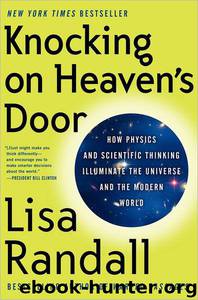Knocking On Heaven's Door by Randall Lisa

Author:Randall, Lisa [Randall, Lisa]
Language: eng
Format: epub
Tags: Non-Fiction, Science
ISBN: 9780061723728
Amazon: 006172372X
Barnesnoble: 006172372X
Goodreads: 11297438
Publisher: Ecco
Published: 2011-08-31T23:00:00+00:00
CHAPTER TWELVE
MEASUREMENT AND UNCERTAINTY
Familiarity and comfort with statistics and probability help when evaluating scientific measurements, not to mention many of the difficult issues of today’s complex world. I was reminded of the virtue of probabilistic reasoning when, a few years back, a friend was frustrated by my “I don’t know” response to his question about whether or not I planned to attend an event the following evening. Fortunately for me, he was a gambler and mathematically inclined. So instead of exasperatingly insisting on a definite reply, he asked me to tell him the odds. To my surprise, I found that question a lot simpler to deal with. Even though the probability estimate I gave him was only a rough guess, it more closely reflected my competing considerations and uncertainties than a definite yes or no reply would have done. In the end, it felt like a more honest response.
Since then I’ve tried this probabilistic approach out on friends and colleagues when they didn’t think they could reply to a question. I’ve found that most people—scientists or not—have strong but not irrevocable opinions that they frequently feel more comfortable expressing probabilistically. Someone might not know if he wants to go to the baseball game on the Thursday three weeks from now. But if he knows that he likes baseball and doesn’t think he has any work trips coming up, yet hesitates because it’s during the week, he might agree he is 80 percent likely to, even if he can’t give a definite yes. Although just an estimate, this probability—even one he makes up on the spot—more accurately reflects his true expectation.
In our conversation about science and how scientists operate, the screenwriter and director Mark Vicente observed how he was struck by the way that scientists hesitate to make definite unqualified statements of the sort most other people do. Scientists aren’t necessarily always the most articulate, but they aim to state precisely what they do and don’t know or understand, at least when speaking about their field of expertise. So they rarely just say yes or no, since such an answer doesn’t accurately reflect the full range of possibilities. Instead, they speak in terms of probabilities or qualified statements. Ironically, this difference in language frequently leads people to misinterpret or underplay scientists’ claims. Despite the improved precision that scientists aim for, nonexperts don’t necessarily know how to weigh their statements—since anyone other than a scientist with as much evidence in support of their thesis wouldn’t hesitate to say something more definite. But scientists’ lack of 100 percent certainty doesn’t reflect an absence of knowledge. It’s simply a consequence of the uncertainties intrinsic to any measurement—a topic we’ll now explore. Probabilistic thinking helps clarify the meaning of data and facts, and allows for better-informed decisions. In this chapter, we’ll reflect on what measurements tell us and explore why probabilistic statements more accurately reflect the state of knowledge—scientific or otherwise—at any given time.
Download
This site does not store any files on its server. We only index and link to content provided by other sites. Please contact the content providers to delete copyright contents if any and email us, we'll remove relevant links or contents immediately.
The Complete Stick Figure Physics Tutorials by Allen Sarah(7368)
Secrets of Antigravity Propulsion: Tesla, UFOs, and Classified Aerospace Technology by Ph.D. Paul A. Laviolette(5370)
Thing Explainer by Randall Munroe(3932)
The River of Consciousness by Oliver Sacks(3600)
The Order of Time by Carlo Rovelli(3188)
How To by Randall Munroe(3107)
A Brief History of Time by Stephen Hawking(3023)
I Live in the Future & Here's How It Works by Nick Bilton(2995)
What If?: Serious Scientific Answers to Absurd Hypothetical Questions by Randall Munroe(2702)
The Great Unknown by Marcus du Sautoy(2693)
Midnight in Chernobyl by Adam Higginbotham(2545)
Blockchain: Ultimate Step By Step Guide To Understanding Blockchain Technology, Bitcoin Creation, and the future of Money (Novice to Expert) by Keizer Söze(2495)
Networks: An Introduction by Newman Mark(2405)
The Meaning of it All by Richard Feynman(2355)
Easy Electronics by Charles Platt(2325)
The Tao of Physics by Fritjof Capra(2273)
Midnight in Chernobyl: The Untold Story of the World's Greatest Nuclear Disaster by Adam Higginbotham(2228)
Introducing Relativity by Bruce Bassett(2120)
When by Daniel H Pink(2116)
